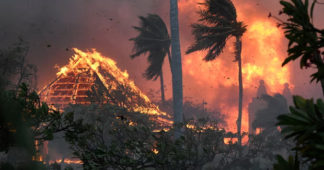World’s fossil-fuel producers on track to nearly quadruple output from newly approved projects by decade’s end, report finds
By Oliver Milman
28 Mar 2024
The world’s fossil-fuel producers are on track to nearly quadruple the amount of extracted oil and gas from newly approved projects by the end of this decade, with the US leading the way in a surge of activity that threatens to blow apart agreed climate goals, a new report has found.
There can be no new oil and gas infrastructure if the planet is to avoid careering past 1.5C (2.7F) of global heating, above pre-industrial times, the International Energy Agency (IEA) has previously stated. Breaching this warming threshold, agreed to by governments in the Paris climate agreement, will see ever worsening effects such as heatwaves, floods, drought and more, scientists have warned.
But since the IEA’s declaration in 2021, countries and major fossil fuel companies have forged ahead with a glut of new oil and gas activity. At least 20bn barrels of oil equivalent of new oil and gas has been discovered for future drilling since this point, according to the new report by Global Energy Monitor, a San Francisco-based NGO.
Last year, at least 20 oil and gas fields were readied and approved for extraction following discovery, sanctioning the removal of 8bn barrels of oil equivalent. By the end of this decade, the report found, the fossil-fuel industry aims to sanction nearly four times this amount – 31bn barrels of oil equivalent – across 64 additional new oil and gas fields.
The US, which has produced more crude oil than any country has ever done in history for the past six years in a row, led the way in new oil and gas projects in 2022 and 2023, the report found. Guyana was second, with countries in the Americas accounting for 40% of all new oil sanctioned in the past two years.
Continue reading at www.theguardian.com
We remind our readers that publication of articles on our site does not mean that we agree with what is written. Our policy is to publish anything which we consider of interest, so as to assist our readers in forming their opinions. Sometimes we even publish articles with which we totally disagree, since we believe it is important for our readers to be informed on as wide a spectrum of views as possible.











